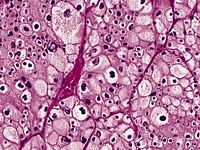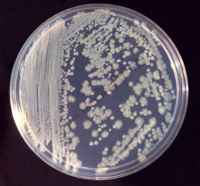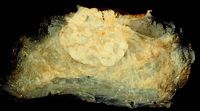Pathology



Pathology (from Greek πάθος, pathos, "fate, harm"; and -λογία, -logia) is the study and diagnosis of disease through examination of organs, tissues, bodily fluids and whole bodies (Autopsy). The term also encompasses the related scientific study of disease processes, called General pathology.
Medical pathology is divided in two main branches, Anatomical pathology and Clinical pathology. Veterinary pathology is concerned with animal disease whereas Phytopathology is the study of plant diseases.
Contents |
History of pathology
The history of pathology can be traced to the earliest application of the scientific method to the field of medicine, a development which occurred in the Middle East during the Islamic Golden Age and in Western Europe during the Italian Renaissance. The first physician known to have made postmortem dissections was the Arabian physician Avenzoar (10911161). Rudolf Virchow (1821-1902) is generally recognized to be the father of microscopic pathology. Most early pathologists were also practicing physicians or surgeons.
General pathology
General pathology, also called investigative pathology, experimental pathology or theoretical pathology, is a broad and complex scientific field which seeks to understand the mechanisms of injury to cells and tissues, as well as the body's means of responding to and repairing injury. Areas of study include cellular adaptation to injury, necrosis, inflammation, wound healing and neoplasia. It forms the foundation of pathology, the application of this knowledge to diagnose diseases in humans and animals.
The term "general pathology" is also used to describe the practice of both anatomical and clinical pathology.
Pathology as a medical specialty
Pathologists are physicians who diagnose and characterize disease in living patients by examining biopsies or bodily fluid. The vast majority of cancer diagnoses are made or confirmed by a pathologist. Pathologists may also conduct autopsies to investigate causes of death. Pathology is a core discipline of medical school and many pathologists are also teachers. As managers of medical laboratories, pathologists play an important role in the development of Laboratory information systems. Although the medical practice of pathology grew out the tradition of investigative pathology, most modern pathologists do not perform original research.
Pathology is a unique medical specialty in that pathologists typically do not see patients directly, but rather serve as consultants to other physicians (often referred to as "clinicians" within the pathology community). To be licensed, candidates must complete medical training, an approved residency program and be certified by an appropriate body. In the US, certification is by the American Board of Pathology. The organization of subspecialties within pathology vary between nations but usually include anatomical pathology and clinical pathology.
Anatomical pathology
Anatomical pathology (Commonwealth) or Anatomic pathology (U.S.) is a medical specialty that is concerned with the diagnosis of disease based on the gross, microscopic, and molecular examination of organs, tissues, and whole bodies (autopsy).
Anatomical pathology is itself divided in subspecialties, the main ones being surgical pathology, cytopathology and forensic pathology. To be licensed to practice anatomical pathology, one has to complete medical school, an approved residency program and be certified. In the U.S., the American board of Pathology certifies pathologists.
Anatomical pathology is one of two branches of pathology, the other being clinical pathology, the diagnosis of disease through the laboratory analysis of bodily fluids. Often, pathologists practice both anatomical and clinical pathology, a combination known as general pathology. Similar specialties exist in veterinary pathology.
Clinical pathology
Clinical pathology, Laboratory Medicine (Germany), Biopathology (Greece), or Clinical/Medical Biology (France, Belgium, Netherlands, Austria...) is a medical specialty that is concerned with the diagnosis of disease based on the laboratory analysis of bodily fluids such as blood and urine, using the tools of chemistry, microbiology, hematology and molecular pathology. Clinical pathologists work in close collaboration with medical technologists.
Clinical pathology is itself divided in subspecialties, the main ones being clinical chemistry, clinical hematology/blood banking and clinical microbiology.
Clinical pathology is one of the two major divisions of pathology, the other being anatomical pathology. Often, pathologists practice both anatomical and clinical pathology, a combination known as general pathology. Similar specialties exist in veterinary pathology.
Forensic pathology
'Forensic pathology' is a branch of Pathology concerned with determining the cause of death by examination of a cadaver. The autopsy is performed by the pathologist at the request of a coroner usually during the investigation of criminal law cases and civil law cases in some jurisdictions. Forensic pathologists are also frequently asked to confirm the identity of a cadaver.
Veterinary pathology
Veterinary pathologists are doctors of veterinary medicine who specialise in the diagnosis of diseases through the examination of animal tissue and body fluids. Like for medical pathology, veterinary pathology is divided in two branches, anatomical pathology and clinical pathology. Veterinary pathologists are critical participants in the drug development process. See also "veterinary pathologist" in Wikipedia.org.
Plant pathology
Plant pathology (also phytopathology) is the scientific study of plant diseases caused by pathogens (infectious diseases) and environmental conditions (physiological factors). Organisms that cause infectious disease include fungi, oomycetes, bacteria, viruses, viroids, virus-like organisms, phytoplasmas, protozoa, nematodes and parasitic plants. Not included are insects, mites, vertebrate or other pests that affect plant health by consumption of plant tissues. Plant pathology also involves the study of the identification, etiology, disease cycle, economic impact, epidemiology, how plant diseases affect humans and animals, pathosystem genetics and management of plant diseases.
See also
- Molecular pathology
- Medical laboratory
- Important publications in pathology
External links
- Association of Clinical Biochemistry (UK)
- American Society for Investigative Pathology
- American Society of Cytopathology
- British Neuropathological Society
- Case Records of the Massachusetts General Hospital - Clinicopathological Conference
- College of American Pathologists
- Flickr group: Pathology and Lab Medicine: numerous photos illustrating the work of pathologists.
- HistoPathology Atlas
- humpath.com (Atlas in Human Pathology)
- Immunohistochemistry protocols and troubleshooting
- Traditional Chinese medicine Pathology
- Mybiopsy.org
- Neuropathology blog
- Pathological Society of Great Britain and Ireland
- Royal College of Pathologists (UK)
- Royal College of Pathologists of Australasia (Australia & Oceania)
- Sullivan Nicolaides Pathology - Leading Australian Pathology Laboratory.
- United States and Canadian Academy of Pathology
- WebPath: The Internet Pathology Laboratory for Medical Education
- Pathtalk.org - A community weblog about pathology-related topics.
- What is a Pathologist? - a perspective from UK pathologist Fraser Charlton.
- Pathologypics - an interactive community-driven histology atlas
|
|||||||||||
|
|||||||||||||||||||||||||||||||
|
|||||